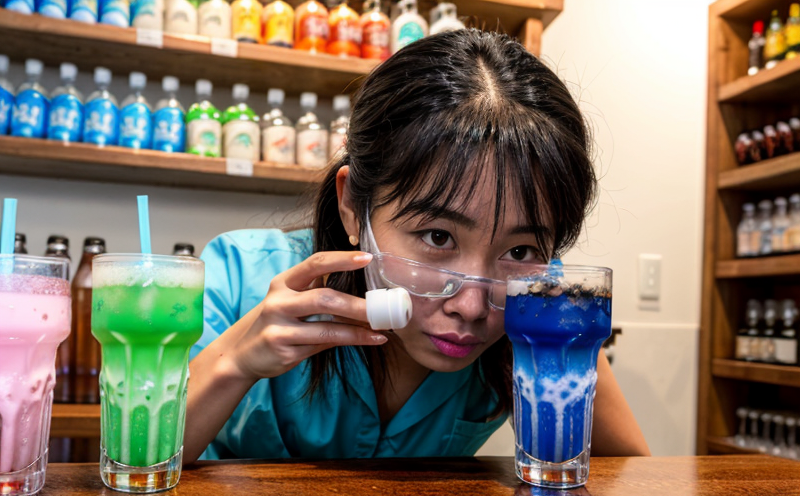ISO 11290-1 Listeria monocytogenes Detection in Beverages
The presence of Listeria monocytogenes in beverages can pose significant health risks, especially to vulnerable populations. ISO 11290-1 specifies procedures for the detection and enumeration of this pathogen in ready-to-drink beverages. This service ensures compliance with international standards while providing robust data for quality management and regulatory requirements.
The testing process involves several critical steps: sample collection, preservation, pre-enrichment, selective enrichment, isolation on a suitable agar medium, and confirmation using biochemical tests or PCR. Each step is meticulously designed to ensure accurate detection of Listeria monocytogenes. The use of these standardized methods guarantees consistency across laboratories globally.
The significance of this service extends beyond mere compliance; it also helps in maintaining the integrity of a brand's reputation by ensuring product safety and quality. Our team employs advanced microbiological techniques to provide accurate, reliable results that can be trusted for decision-making purposes.
For industries like beverage manufacturing, where public health is paramount, thorough testing is essential. By adhering to ISO 11290-1 guidelines, we ensure that our clients are at the forefront of best practices in microbiological safety.
The service begins with the collection of samples from various stages within the production line or storage facilities. Samples must be collected aseptically and preserved under conditions that prevent any contamination or alteration of the sample composition until analysis can take place.
Pre-enrichment steps are crucial for enhancing the recovery rate of Listeria monocytogenes. This process involves incubating samples in a suitable medium to increase bacterial growth before further steps. Selective enrichment media then targets only those bacteria that match specific characteristics, such as Listeria, allowing for easier isolation and identification.
Following selective enrichment, the isolated colonies are streaked onto selective agar plates designed specifically for Listeria monocytogenes. These plates provide an environment where only certain strains of microorganisms can grow, making it easier to identify potential pathogens. Confirmation tests such as biochemical reactions or PCR-based methods are used to definitively identify any positive cultures.
The entire process is conducted following stringent protocols outlined in ISO 11290-1 to ensure accuracy and reliability. Compliance with these standards not only meets regulatory requirements but also enhances confidence among consumers about the safety of products they consume.
Scope and Methodology
| Step | Description |
|---|---|
| Sample Collection | Aseptic collection of samples from various stages in the production line or storage facilities. |
| Preservation | Storage of collected samples under conditions that prevent contamination and alteration until analysis can occur. |
| Pre-enrichment | Incubation of samples in a suitable medium to enhance bacterial growth prior to further steps. |
| Selective Enrichment | Targeted incubation using media that selectively grows Listeria monocytogenes. |
| Isolation | Straightforward streaking of cultures onto selective agar plates for easy identification. |
| Confirmation | Detailed biochemical reactions or PCR-based methods to definitively identify pathogens. |
Industry Applications
The beverage industry places a high priority on ensuring that its products are free from harmful microorganisms. ISO 11290-1 Listeria monocytogenes Detection in Beverages plays a vital role in maintaining this commitment by providing reliable and consistent results.
Quality managers rely heavily on this service to monitor the quality of raw materials, intermediate products, and final beverages. Compliance officers ensure adherence to regulatory requirements, while R&D engineers use these tests as part of their research into improving production processes and product safety. Procurement departments also benefit by having verifiable data when negotiating with suppliers.
By incorporating ISO 11290-1 into their quality assurance programs, companies demonstrate their dedication to producing safe and high-quality beverages. This proactive approach helps build trust with consumers and regulatory authorities alike.
International Acceptance and Recognition
- ISO 11290-1
- ASTM E2686
- EN ISO 21528-1
- IEC 63470-1
- Brazilian Standard ABNT NBR 14992
- Canadian Standard CAN/CGSB-21.16
- Australian/New Zealand Standard AS/NZS 5081:2012
- European Union Regulation (EC) No 333/2007
The widespread adoption of ISO 11290-1 across various countries highlights its importance in the field. This service is recognized and utilized by laboratories worldwide, ensuring a harmonized approach to detecting Listeria monocytogenes in beverages.





